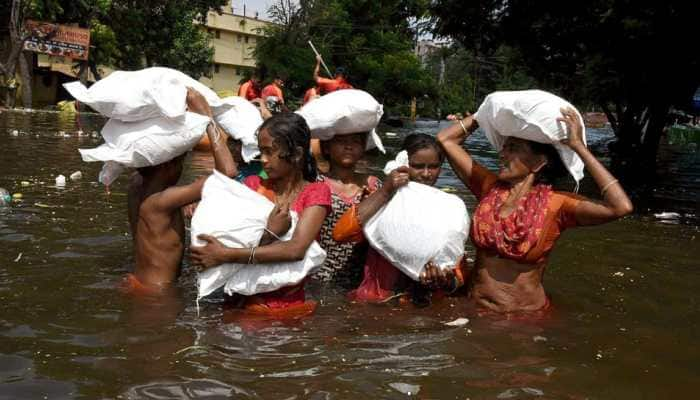Uttarakhand glacial burst: Indian Navy, Air Force conduct joint operation to measure depth of glacial lake in Tapovan, Watch video
The temporary water body was formed after sediments that the catastrophic flash flood earlier this month brought down, blocking the mouth of a stream that joins the Rishiganga river. According to the Central Water Commission, the lake is 400 metres in length, 25 metres wide and 60 metres deep.
- Indian Navy and Air Force conducted joint operation to measure glacial lake's depth
- The lake is 400 metres in length, 25 metres wide and 60 metres deep
- At least 65 people were killed and 139 went missing in the glacial disaster
Trending Photos
) Credit: IANS
Credit: IANS New Delhi: The Indian Navy and Air Force conducted a joint operation on Saturday to measure the depth of the glacial lake formed in Tapovan after the devastating flash flood in Uttarakhand’s Chamoli district on February 7 in which at least 65 people were killed and 139 went missing.
The artificial lake was formed over Rishiganga following the disaster.
The joint operation by the naval divers with assistance from the air force took place at a height of 14,000 feet above the mean sea level.
Watch the video here:
#WATCH In a joint Indian Navy-IAF operation on 20 Feb, naval divers were winched by IAF's Advanced Light Helicopter at a height of 14000 ft to measure the depth of the glacial lake formed 5 km upstream of Tapovan, Uttarakhand pic.twitter.com/5gs6kZwagA
— ANI (@ANI) February 21, 2021
“The Naval divers undertook the challenging task of winching down from the helicopter and recording of depth using a handheld echo sounder (depth measuring equipment) in the near freezing waters. Throughout the evolution, the IAF pilots maintained accurate positioning in the difficult terrain,” the Navy was quoted as saying by PTI.
According to the Central Water Commission, the lake is 400 metres in length, 25 metres wide and 60 metres deep.
The data will help scientists determine the pressure on the mud wall of the dam.
The temporary water body was formed after sediments that the catastrophic flash flood earlier this month brought down, blocking the mouth of a stream that joins the Rishiganga river.
The water catchment not being natural the administration urgently needed to assess the condition of the catchment by measuring the depth of water.
“With no road access and time criticality Indian Navy diving team were quickly mobilised onboard the IAF ALH,” the Navy said.
The glacial burst over Rishiganga had triggered an avalanche which had demolished a 13.2 MW hydel project along the river besides causing extensive damage to the NTPC's Tapovan-Vishnugad hydel project along Dhauliganga.
Stay informed on all the latest news, real-time breaking news updates, and follow all the important headlines in india news and world News on Zee News.
Live Tv







)
)
)
)
)
)
)
)
)
)
